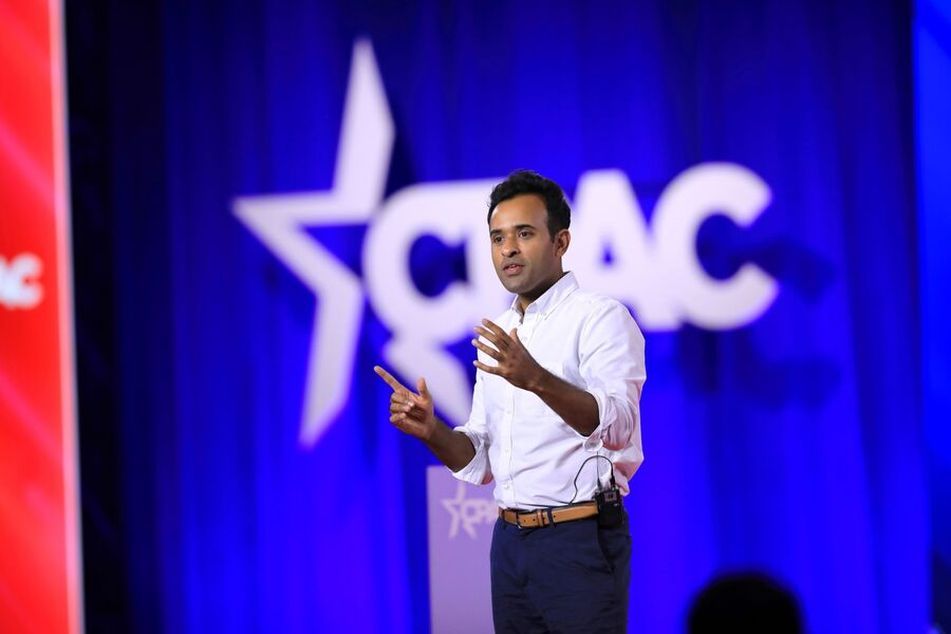ESG opponent Strive gets warm welcome from some state pensions
 Strive co-founder Vivek Ramaswamy
Strive co-founder Vivek Ramaswamy
Co-founder Vivek Ramaswamy, who recently stepped down to campaign for president, has said he wants to take politics out of investing.
Just a year after it was founded, Strive Asset Management has won a state pension contract through its proxy advisory affiliate — and it’s gunning for much more.
The company has met recently with pension officials and politicians in numerous states, including Missouri, Pennsylvania, Alaska, South Carolina, West Virginia, North Dakota, Oklahoma and Utah. And it currently has a contract advising on proxy voting issues with the $46 billion Indiana Public Retirement System.
Strive and its co-founder Vivek Ramaswamy have called out the use of ESG criteria in investing as political in nature, pitching its consulting services to institutions as a way to “depoliticize” investment management.
That stance puts the new firm at odds with asset managers as a whole — many of whom consider environmental, social and governance data as apolitical information used to help assess investment risk and opportunity, regardless of whether they are sustainable investment shops.
“This is one of the clearest examples of a company profiting off of a culture war,” said Jesse Coleman, senior researcher at watchdog journalism project Documented, which provided numerous public records detailing Strive’s communications with state pension officials.
“Strive and Vivek Ramaswamy, they’re really using the connection to the [state] treasurers to get to the decisions makers on the pension boards, which is an interesting strategy — and seemingly other asset managers do it this way,” he said. “It’s not like the asset management world’s hands are squeaky clean.”
However, the use of a proxy advising consultant closely affiliated with an investment provider raises the potential for conflicts of interest, Coleman said. The letters of intent that Strive has sent to some states regarding its consulting services include a rubric for judging asset managers, which could cast the company’s line of new ETFs in a favorable light, he noted.
In the near term, it could be difficult for a fiduciary to justify hiring an asset manager with a short track record, but engaging a proxy advisor consultant might be a different matter. Indiana’s public pension, INPRS, referred questions to its public records request system and declined to comment on its hiring of the firm. Strive did not respond to a request for comment.
“We’ve always made our decisions on how we invest our money based on those financial, economic or pecuniary principles. We have not ever made any of our investment decisions based on ESG,” INPRS deputy director Tony Green said in testimony during a state hearing in January.
“Even though we are investing our money based on pecuniary or economic and financial principles, others might have different agendas,” Green said. “We became aware of other collateral issues out there, like proxy voting … During that process, we’ve hired another consultant, Strive Asset Management, to come in and help us advise as we are trying to figure out how to reconcile these proxy votes.”
One of the ways Strive appears to be courting state pensions is by conveying that the cost of moving proxy voting in-house — and away from asset managers — could be negotiated with those asset managers. The letter of intent the firm sent to the Oklahoma Teachers’ Retirement System, for example, outlines that as a service it could offer, according to public records provided by Documented.
Another pension group, the Missouri State Employees’ Retirement System, last year hosted an educational session on ESG for its staff, featuring Ramaswamy as the lead presenter.
Ramaswamy last month announced that he had stepped down from his role as chairman of Strive in order to campaign to be the Republican candidate for president in the 2024 election.
[More: Strive Asset Management chairman Vivek Ramaswamy resigns to run for president]
Why flexibility remains essential when it comes to retirement spending
Learn more about reprints and licensing for this article.








